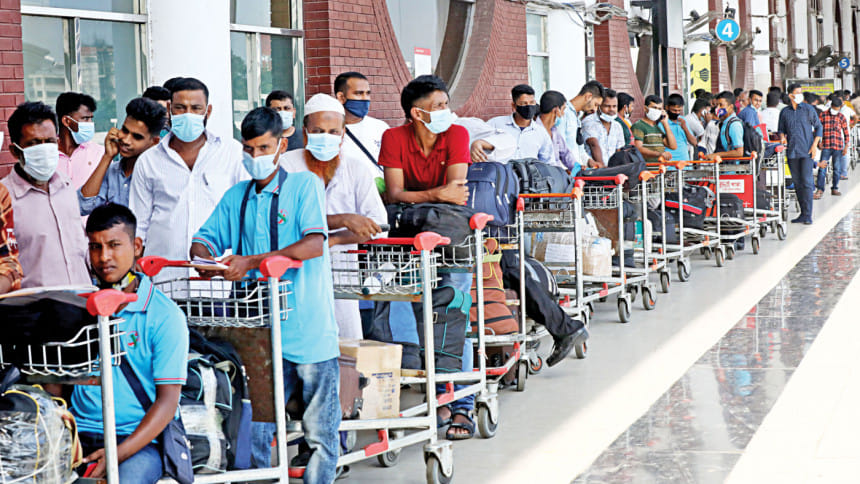Escalating Opportunities for Expatriates

While Bangladesh earns a significant portion of its foreign currency inflow through exports and remittances, the recent Offshore Banking Act of 2024 presents a new avenue for boosting foreign reserves. Of the estimated 10 million Bangladeshi expatriates, approximately 2.4 million are either permanent residents or hold valid documents in as many as 162 countries. The new Offshore Banking Act aims to facilitate offshore banking, especially for Bangladeshi expatriates.
Most banks initially focused their offshore banking products on attracting white-collar Bangladeshi professionals working abroad. However, there is now a recognition of the potential market among semi-skilled and low-skilled workers as well. Despite a large segment of expatriates being semi-skilled or low-skilled workers without disposable income, some are showing interest in depositing their savings through offshore banking. While nearly all banks prioritize high-income professional expatriates, certain banks, such as City Bank, are also reaching out to other remittance earners. In this regard, City Bank's Mahbub Jamil, head of Offshore Banking, has made some insightful observations:
"A significant number of Bangladeshi expatriates, primarily small business owners in the Middle East (UAE, KSA, Qatar) and Europe (Belgium, Italy, Portugal), belong to the middle-income and better-off segments, even if they are not highly professional. For these individuals, we offer a minimum deposit of $2,000, compared to $5,000 for white-collar professionals. While many low-skilled and semi-skilled expats in KSA earn around 1,500 Saudi riyal and cannot make fixed deposits, a growing number of middle-sized entrepreneurs are showing interest in offshore banking. Notably, we have surpassed other banks, holding nearly seven times the number of offshore accounts."
Thanks to government initiatives, Bangladesh is increasingly supplying skilled and professional migrants to the global labor pool, moving away from low-skilled jobs. As Bangladesh graduates from its Least Developed Country (LDC) status to a developing country, it will create more opportunities for Non-Resident Bangladeshis (NRBs) to invest in Bangladesh. During conversations with Mahbub Jamil, he reveals that a large number of high professionals, particularly in the Middle East, include doctors, mariners, and bankers.

It may be noted that around 2,800 expatriate Bangladeshi bankers are actively working in Middle Eastern countries, and 10,000 to 12,000 mariners are also involved in maritime activities, earning between $5,000 and $10,000. Some of them do not hold foreign passports and primarily reside in Bangladesh. The Bangladeshi government's overseas welfare scheme has designed various investment opportunities and products for them, making them potential clients for offshore banking as well. The type of expatriates City Bank is targeting for offshore banking products is further illustrated by Mahbub Jamil's comments on an ideal white-collar customer: "One of our big depositors is a sea captain who primarily worked in Oman and Bahrain and is now employed as a shipping official."
Other banks, such as BRAC, EBL, and MTB, are mainly targeting white-collar job holders by offering various benefits, including tax exemptions, high returns, and other investment opportunities. BRAC Bank's outreach product, "Bondhon," exemplifies this approach, as noted by a BRAC Bank official.
Incentives and Product Promotion for Popularizing Offshore Banking
Although offshore banking has been in operation since 1985, recent amendments have significantly elevated its importance under the Offshore Banking Act of 2024. Many scheduled banks are now actively working to attract foreign currency inflows, following instructions from the central bank. To popularize offshore banking, various outreach programs and marketing strategies are being employed. Key strategies include targeted marketing aimed at white-collar job holders, offering digital banking services, providing investment advisory services, special benefits on home loans, assistance in wealth management, corporate governance initiatives, and meet-and-greet programs for potential clients.

When inquired about Bank Asia's initiatives to popularize offshore banking services and enhance balance sheet size, the bank's Senior Executive Vice President and Head of the International Division, Md Zia Arfin, mentioned the following: offering various products and services, dedicated customer service, collaboration with the government, competitive pricing for both deposits and advances, an easy and quick account opening procedure, digital banking services, marketing and promotional campaigns, collaborations with international financial institutions, consultancy and investment advisory services, participation in global forums and events, and collaboration with export-oriented industries.
Almost all leading scheduled banks are likely to promote offshore banking products by incentivizing remittance earners. In this regard, Bank Asia outlines its incentives:
"Banks in Bangladesh use several strategies to promote offshore banking products to incentivize remittance earners, particularly Non-Resident Bangladeshis (NRBs), to encourage the inflow of remittances and enhance their financial engagement. These initiatives focus on building awareness among expatriate communities abroad, offering tailored products, attractive interest rates, and simplified services."

 For all latest news, follow The Daily Star's Google News channel.
For all latest news, follow The Daily Star's Google News channel. 



Comments